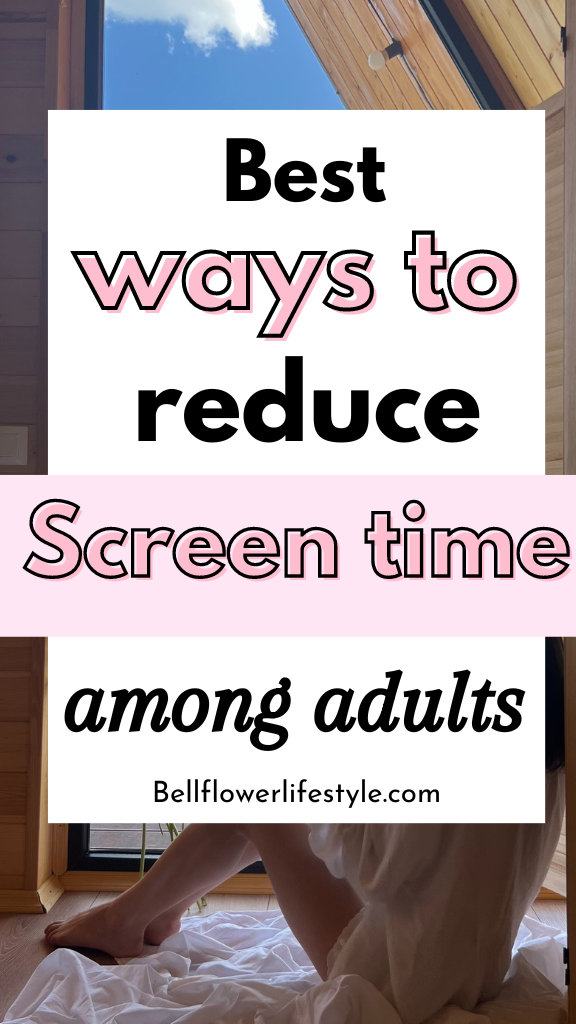21 Best ways to reduce screen time for adults
As an adult, are you struggling with your relationship with devices? If you wish to reduce your screen time, here are the best ways to reduce screen time for adults

This post may contain affiliate links, which means I’ll receive a commission if you purchase through my link, at no extra cost to you. Please read full disclosure here.
I felt the need to write this post because it has been a personal struggle of mine.
As convenient as the internet has gotten in life, it has also built this addiction – the need to keep checking phone or laptop.
Especially since my work is also online, It has led me to spend all day using the screen.
It reached a point where my eyes started to hurt and itch because I had spent so much time working online.
I felt like I had nothing else to do despite using my phone! And I hate using it at the same time.
I realized I needed to make an extra effort to reduce my screen time, and I am still working on it!
However, many things have worked out for me and helped me limit my time, which I will share in this post.
Best ways to reduce screen time for adults
But first, pin it for later!

Before I share the ways, I want to assure you that reducing your screen time is possible!
When you feel trapped in this cycle of using your devices all the time, It can feel like there is no way out.
It can seem tough because the urge to keep using our devices is so strong. But by making an intentional effort, I want to let you know that, it is 100% possible!
Should adults reduce their screen time?
I know adults give a lot of focus on kids’ screen time because they need it, but at the same time, adults need to!
Right now, it is more difficult for adults to reduce their screen time because the only people accountable for their screen time are themselves.
With kids, older people can easily take charge and take away their phones, but for adults, this can be challenging.
Hence, adults need to reduce their screen time at this age!
Here are some benefits –
Benefits of reducing your screen time
Reducing screen time is essential at this age because it can help us reconnect with the world.
As we are transitioning more and more to virtual reality, the connection people have in person is getting lost.
We meet fewer people physically and struggle to connect and communicate.
Reducing your screen time as an adult can help you
- Sleep better
- Connect and socialize in real life more
- Have healthy eyesight
- reduce headache
- Connect with the world and yourself
- Engage in real-life activities
- Find meaning and happiness in the moment
- Increase focus
- Reduce distraction and procrastination
- Improve mental health
- Less comparison and more focus on self-growth
- Enjoy life and be happy
What is an unhealthy screen time? How much screen time is good for adults?
Many people, tend to say that their screen time is normal, even though IT IS NOT!
It is said that one should not spend more than 4 hours a day using screen time aside from work.
if your screen time is more than that, then it has reached an unhealthy point.
You need to make efforts to reduce your screen time so you can improve your life! You can engage in the real world and enjoy the present more.
To take care of your eyes, brain, and mental health as well!
Reducing screen time for adults is essential for maintaining a healthy work-life balance, mental well-being, and physical health.
21 ways to reduce screen time for adults
1. Set specific goals:
Determine how much time you want to spend on screens each day or week and create a plan, to gradually reduce your screen time, to meet those goals.
In the beginning, you may find it challenging to drop your screen time completely, so start slow and set a goal.
For example- each week, reduce your screen time by 10% more
2. Track your usage:
In the iPhone, there is a screen time feature built that tells you how much screen time you have in a week and what apps you are using the most.
Use apps or built-in features on your devices to monitor your screen time. This can help you become more aware of your habits and identify areas for improvement.
You will be shocked to see what apps take most of your time!
3. Limit social media Usage
If you do check your screen time, you will find the most used apps are social media that are keeping you hooked on screen!
That is exactly, why you need to limit your social media usage! Some of the ways I try to limit my usage of social media is
- Being on, a few social media platforms like only 1-2. many people have all social media apps logged in, which makes them check each app again and again.
- Deleting the apps whenever I find myself using a social media app way too much that I can’t help but check the updates. It is time for me to delete the app for a while.
- Posting less: if you are actively posing on social media a lot. You will find yourself checking apps again and again. So the fewer you post, the better it is
- Keep me occupied in activities: Activities like cooking require your full attention so you don’t look at your phone. Keep yourself occupied
4. Prioritize offline activities/ hobbies:
This year, I took the step to indulge in offline hobbies that massively decreased my screen time. Usually, I come home from the office and spend time on the phone watching a show or something.
This year, I signed up for a hobby class after work for 2 few hours, which helps me stay away from the screen and engage in activities in real life.
Make a list of activities you enjoy that don’t involve screens, such as reading, cooking, exercising, or spending time with loved ones.
Prioritize these activities over screen time. Here are 23 Screen offline hobbies for adults to enjoy
If you want to reduce your screen time, you have to keep yourself engaged as well in other activities. It can be any alternative activity you can do
Explore hobbies or interests that don’t involve screens, like playing a musical instrument, gardening, or doing crafts.
5. Create a schedule for screen time:
Another great way to reduce screen time as an adult is by creating a block time for usage.
Set specific times during the day when you will engage with screens and times when you won’t. Stick to this schedule to limit your screen exposure.
6. Use an analog clock instead!
Many people have this excuse that they set their alarm on their phone, because of which they keep their phone at the bedside and end up using it after waking up.
No excuses are needed, as you can easily switch to an analog clock to wake yourself up and avoid touching your phone right in the morning and getting distracted for hours!
7. Turn off notifications:
A few years back, I implemented this idea of turning off all my notifications except messages and calls, of course. So, I do not get any notifications for any app.
This helped me limit myself from using the screen and getting distracted from the notification that keeps popping up otherwise!
Disable non-essential notifications on your devices to reduce the constant pull of your attention to screens.
8. Have screen – free meals
This is a huge challenge for me as I usually like to watch something while eating.
However, eating without a screen can help you be more mindful and give your attention, to eating it slowly, and fully digesting it.
Moreover, if you have people around you eating as well, like friends and family, it is better to engage with them rather than, being on your screen!
Plus, we all know that the food gets finished in a minute, but we stay hooked to the show or movie for at least 30 minutes to an hour!
9. Establish tech-free zones:
Designate, certain areas in your home where screens are not allowed, such as the dining room or bedroom.
It helps you stay in that room without a screen and do something else. I have seen many people a rule of no screen in the bedroom, so, they can spend quality time with their partner.
Instead of watching TV or being on their phone, which flourishes their relationship!
10. Implement the 20-20-20 rule:
Every 20 minutes, take a 20-second break and focus on something 20 feet away to reduce eye strain from prolonged screen use.
It can help you protect your eye, especially if your work requires a screen!
Set a 20-minute alarm or timer, again and again, so you can be reminded to look away every 20 minutes for 20 seconds!
11. No screen till breakfast
Ideally, you should not use your phone first thing in the morning both for your eyes and brain- also, it can affect your productivity!
Set a rule to not use the screen until you have finished your breakfast and your morning routine.
12. No screen 1 hour before bed
Similarly to morning, avoid screens at least an hour before bedtime to improve sleep quality and reduce the impact of blue light on your circadian rhythm.
Get a book to read and go to sleep. You can also journal until you feel like sleeping and then go to bed!
13. Learn to be okay with doing nothing.
Most of us, feel the urge to use our devices because we are bored and have nothing to do. Keeping yourself occupied helps in staying away from the screen.
But you cannot always have something to do. Learn to be okay with getting nored and doing nothing.
This helps reduce your dopamine and improves your focus and productivity.
Embrace, boredom, silence, and observe around you when you have nothing to do!
14. Plan social interactions:
Instead of texting or social media, arrange in-person or phone conversations with friends and family to maintain social connections.
Whenever I am heading out and meeting people, I forget to even touch my phone, because we are enjoying the real in-person conversation with other people!
So, if you stay at home, you are more likely to touch your phone than you would being out!
Plan, meet-ups, with other people, attend workshops, and do as much social interaction as possible.
15. No screen while doing chores
As the usage of screens has increased over the years, people now tend to use their devices for everything. Listening to podcasts or watching a movie to stay distracted while cleaning
While it may seem like a good way to get your chores done without feeling exhausted
It is also keeping you addicted or hooked to your devices that you will reach a point where you will not be able to do anything without your phone.
Set a goal today to not do any of your chores with the screen. Stay fully present in the activities you are doing, like cooking, cleaning, and so on
16. Practice mindfulness:
Engage in activities like meditation or yoga to help reduce stress and screen time, as they can improve your mental clarity and well-being.
Being mindful of your urges will also help you limit the time, you spend on social media, as you know what you are doing!
17. Set boundaries at work:
When your work requires screen use, and you have a job with supervisors, it may feel challenging to avoid screen.
I think your health is more important than anything, and no matter how much your boss pressures you need to pay attention to your well-being.
Define specific working hours and breaks to minimize screen exposure during personal time. Communicate these boundaries to colleagues and supervisors that you will have to take screen breaks in between work hours!
If you are self-employed, you can easily limit your time by being firm about it!
18. Delete all distracting apps for a while
As I mentioned in one of the points above, whenever I find myself, using an app too much, I just delete it for a while.
If you find yourself getting distracted by some apps like Instagram, Snapchat, or Netflix, you cannot seem to stop yourself from using,
it is time you delete these apps for allow – like 24 hours, or weekends, or a whole week.
19. Set reminders
If you keep forgetting that you have to reduce your screen time, you should set reminders for yourself!
20. Seek support:
Share your goals with friends or family members who can help keep you accountable and encourage your efforts to reduce screen time.
21. Consider digital detox weekends or vacations:
Take occasional breaks from screens to reset and recharge, even if it’s just for a day or a weekend.
Conclusion
Remember that reducing screen time is a gradual process, and it may take time to adjust to a new routine.
Be patient with yourself and focus on the benefits of a healthier balance between screens and other activities in your life.

if your liked this post, you will love
Follow me On Pinterest





